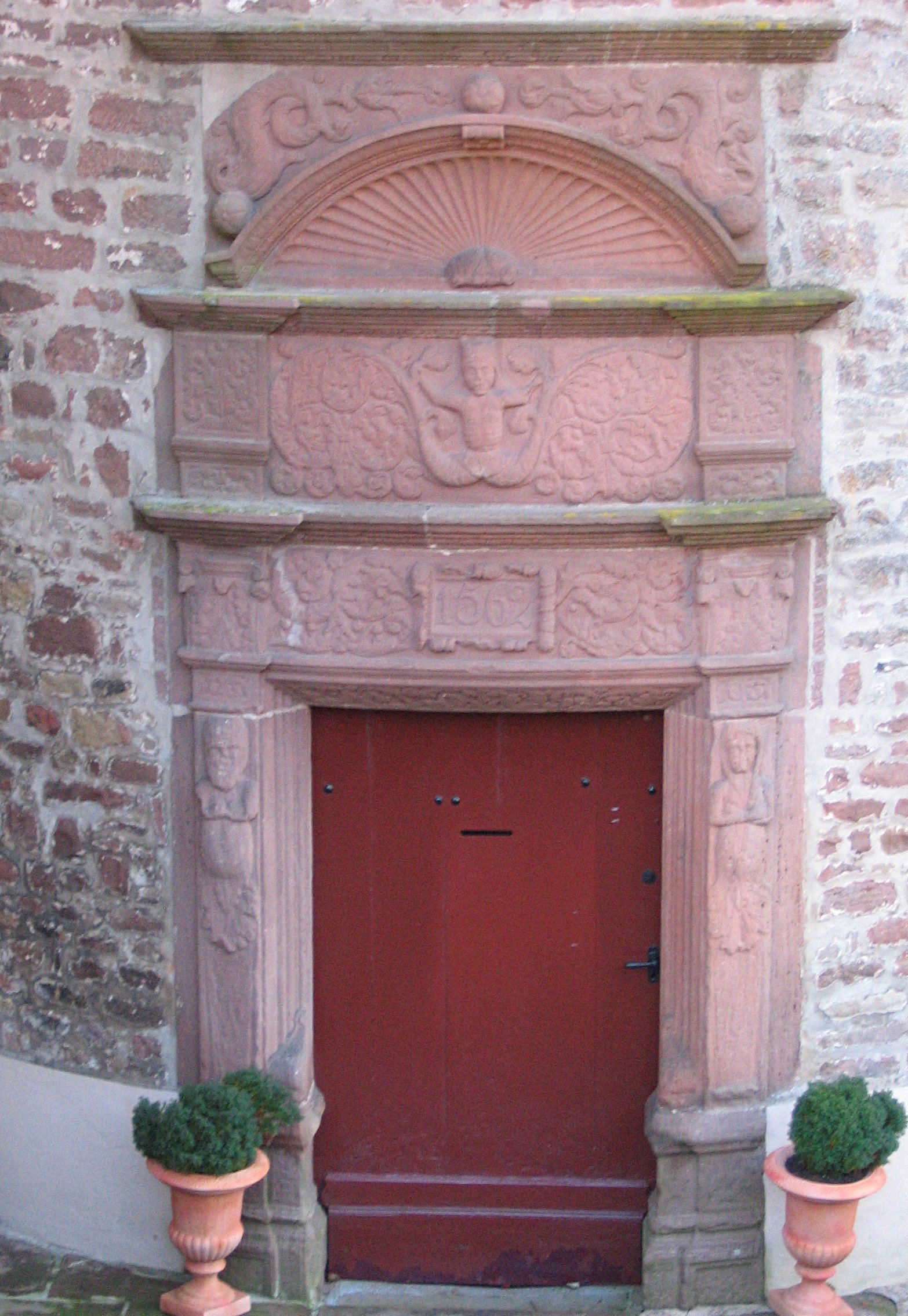Solving the Monty Haul Problem
by Joe Wetzel (joewetzel at gmail dot com)

What’s behind door #1? Pisa – Cathedral – Ancient bronze door by Bonanno.
The “Monty Haul” probelm in role-playing games is named after Monty Hall, the TV game show host of “Let’s Make A Deal.” On “Let’s Make A Deal” Monty would give prizes to contestants for doing virtually nothing but choosing between doors or boxes or whatever with prizes behind one choice.
In role-playing games, it refers to game campaigns where the players are given too many powerful magic items. How many is too many? Some GMs feel one permanent magic item per player per level is appropriate, as long as they aren’t exceeding powerful. Other GMs may add allow a bit more, while some GMs have a very low-magic game setting.
Another way to tell is to consider the how effective the group is considering the challenge of the encounters they are facing. If the group averages 4th level, and they get barely a scratch in encounters designed for their level, you probably have a problem. However, it may also be a sign your players are working well together (which is good, unless there are some role-playing reasons that they shouldn’t be acting as a team.) The problem may be that you are not running the encounters effectively by using creatures’ special abilities, spells and magic items.
A fourth possible reason your group may be doing too well is if the players have memorized the statistics for all the creatures and they are using their out of game knowledge too much. (For help with this problem see the sections on running encounters and modifying creatures.)
After reviewing all of the above, if you feel your campaign has the Monty Haul problem, there are many possible ways to solve it. Below are several options:
Do Nothing
Not quite do nothing, but with this approach the game master doesn’t need to take any special action against the players. Instead, let the players progress in level until their levels better match the encounter levels without awarding them any permanent magic items.
You may still award the group some treasure, including magic items, but make them less powerful or limited use items. If the group’s only fighter already has a +3 sword, a +1 sword won’t affect the game balance much. Likewise, while a potion may be useful once it won’t vastly improve the group’s effectiveness.
This strategy can work well if the group is only slightly unbalanced, but if there is a great disparity it would take many gaming sessions before the characters will match the encounters.
Be Picky About Encumbrance
Another way to solve the Monty Haul problem without taking much action is to enforce the encumbrance rules. For example, a character with a 12 strength can only carry 43 pounds of equipment before it affects his dexterity, making him less effective in combat. The same character can not carry more than 130 pounds.
Along with encumbrance, remember that a character’s armor also affects his dexterity. For example, a character with chainmail armor cannot apply more than 2 points of his dexterity bonus.
These two rules make the characters less effective in combat and limit the amount of equipment they can bring as well as the amount of treasure they can take.

Or Door #2? Chateau Birkenwold by Denis Helfer.
Steal Some Items
This strategy can prove useful as a different way to continue a campaign if some powerful item is stolen from the characters and they are encouraged to track the thief. This can be a short quest or a long one or even one where they never find the original item or it is changed and less powerful.
Be sure to allow the players a chance to detect the thief. The check may be against a very high level thief giving the players very little chance to detect the event, but it allows the game master to say, “remember that roll I gave you earlier” if asked why the character wasn’t aware of the theft.
But a thief isn’t the only way to separate the players from some of their treasure. While the players are adventuring, the bulk of their monetary treasure has to be somewhere. It is possible it is hidden in the basement of their keep (or a similar place, where a thief could steal it) but it is more likely the characters are putting it to some use.
If they have left it with a bank, it is possible the bank has gone out of business. (And has no insurance, too bad.) Or perhaps the bank owner skipped town taking all he could. (Again, this can be the source of another adventure.) Or perhaps whoever the players had managing their assets (building a keep on their behalf or running their estate, for example) figured they could move off to some far off land with those assets.
If you wish to use this strategy, be careful to consider the maturity of the players involved. While most understand it is just a game and they have the opportunity to retrieve the item, some players get attached to their characters and their character’s belongings. If this situation may be the case, you may wish to use a different strategy for handling the Monty Haul problem or you may want to make it very clear to the player that they will have the opportunity to get the item back.
Remember that Fire Burns, And Other Effects
Has a fireball been cast in the direction of your group? If so, don’t forget item saving throws! For powerful magic items, the saves are relatively good but this is a useful game mechanic for possibly destroying some of the items the players have.
Many spells may trigger item saving throws including those with fire, electricity, acid or even cold. But some non-magical situations may trigger item saving throws such as a natural fire or a crushing blow from a fall. If the characters must swim, there is a chance an item will be lost.

What about door #3? Replica of the Gol Stave church western door by Tom Bjornstad.
Crooked Money-Changer
In addition to stealing, another way to separate players from their monetary treasure is through a crooked money-changer. Often, players wish to convert large numbers of coins into gems and jewelry for easier transport. (Especially if the game master has been enforcing the encumbrance rules.)
It was almost common in the middle ages for jewelers to rip off customers by giving them semi-precious stones instead of precious ones or by giving them gems with many flaws. It happens often enough today. Obviously if one of the characters has the appraise skill he may discover the ruse.
Tax Collection
Death and Taxes are the two constants in the universe. Even among barbarians, the leader may take his pick of the treasure. Therefore, a group of the king’s guards (or other officials appropriate for the game’s setting) may visit the players to make sure the king (or government) gets his share.
The tax collector may even take whatever item(s) he wants simply because he wants them more than coins and gems or because the players don’t have enough coin the pay the taxes on their othrer treasure.
Cursed Items
Finally, an item may have a hidden curse or may have some limited number of charges or in some way is not what it was originally thought to be.
Although the Identify spell is supposed to determine all magical properties of an item, perhaps Identify wasn’t used on the item and the players assumed what it was. Or if the players asked someone else to Identify the item, perhaps that person held something back. Or some other spell may have been used to disguise the item as something else or hide a property of the item.

This work is licensed under a Creative Commons Attribution-Share Alike 3.0 License.

A lot of these ideas are a little dangerous to DM-PC Relations. One idea is to just talk to your players about the imbalance. Offer them XP for giving away a few items in character. Or, for gameplay reasons, let them know you need some of them to go away, be less powerful, or work differently. This works well for groups that are imbalanced within the group (The fighter has 50% of the group’s wealth in magic items.)
A few of these ideas break the rules, something that many PCs will call you on if you attempt to do them solely to get rid of gear. Most spell do not call for item saving throws unless the character rolls a 1 on his Reflex saving throw. I’ve seen gear lost to Black Dragons, but this doesn’t happen too often. There are no similar checks for swimming.
As for Encumbrance as a fix… most groups invest in Bags of Holding and the like early, so encumbrance becomes a non-issue very early. Even with the weight restrictions on bags of holding (by type) most groups can travel with a lot of gear. This also keeps the gear out of the way, so it’s less likely to have to make a saving throw (of course… taking out the bag is a new option). Once the Leo’s Secret Chest spells becomes an option, even this doesn’t work anymore.
Of course if you want to target gear on PCs, you can use Rust Monsters and Ethereal Flitchers. Advance them with Hit Dice, Templates, levels, etc if you need to. Just remember your PCs will hate you for it.
Another option is to Arrest or Capture the PCs, and have them stripped of their gear. They may get some of it back in the escape attempt then almost always follows, but you can use opportunity to have some of their stuff looted, tossed out, or destroyed. “That +5 holy avenger? Sorry but the Demon Prince had it destroyed… but you can loot his +2 flaming longsword once you kill him.” It also lets you have some fun turning the PC’s gear against them for a while. “The Bugbear tribe chief is using your +2 Great sword!” this also allows you to control what the PCs get back as they have to loot it off the bodies of their captors… and not all of it may turn up.
Of course the best answer is don’t get them so much in the first place.
Sometimes the best thing to might just be to make more powerful monsters. For instance, Joe the barbarian is level 3 and has gotten a +3 great sword with which he is killing everything in a blow or two. Suddenly the group comes to know that they have to face cursed bears(instead of regular ones)with +3 armor.
Sometimes a bit of roleplaying can change a disaster into a success.
Enjoy
Sujoy
I’d be careful that pumping up the foes doesn’t make the encounters too difficult for party members without as much special equipment.
Arrest or capture the heroes and strip them of their possesions may be a good idea, but it also works to make them the kingdom heroes. “Ok, so you are the brave that cleaned the valley from goblins, uh? And you did not take a single scratch, right? Well, you are the heroes we were waiting for. We shall command you to drive off the black dragon which dwells in the Swamp of Darkness beyond the Wood of Despair. And you are not going to disobey your King, mmm?. Ok, we supposed you will gladly accept this quest….”
I’ve had this problem a number of times over the years. Since a characters proportionate wealth/level scales so quickly, I find the most efficient solution is to just speed up the leveling process for a few levels. You can do this via the monsters that you throw at the group, or by awarding more quest xp. In the mean time, make sure any new magical items you hand out to the group are more appropriate for the less overly burdened by wealth characters.